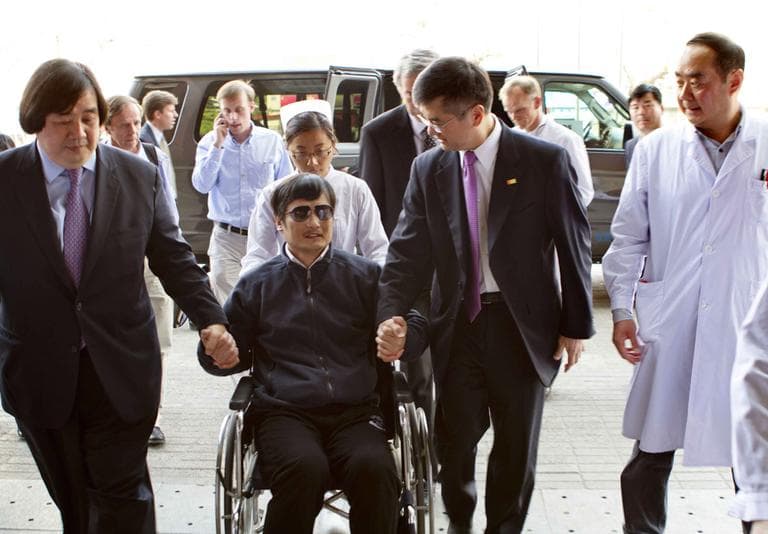Advertisement
Chinese Dissident Finds Friend And Legal Adviser In NYU Professor
Resume
New York University said on Friday that they'd offered Chinese dissident Chen Guangcheng a spot as a visiting scholar.
Jerome Cohen, an NYU law professor and a friend to Chen, helped arrange for the visiting scholar position. Cohen has been in contact with Chen throughout the diplomatic crisis. They first became friends ten years ago when Chen was in the U.S. on an international visitor's fellowship.
The NYU offer came after the Chinese foreign ministry announced Friday that Chen could study in the U.S. under a student visa, like 300,000 other Chinese. It's seen as a face-saving compromise that allows Chen to leave the country, but not as a heralded exile.
"It was getting late at night, everybody else had gone to bed and he discovers the place is infested with Chinese security police."
Jerome Cohen, NYU law professor
Chen is a blind, self-trained lawyer, who escaped from house arrest and sought refuge at the American Embassy in Beijing. Chen left the embassy this week for a hospital after a negotiated deal that would have allowed him to stay in China and study law formally.
But that deal fell apart when Chen said his wife had been threatened by Chinese authorities. From his hospital bed, Chen spoke to members of the U.S. Congress and the foreign press, and said he wanted to leave China with his family.
Chen's Change Of Heart At The Hospital
Cohen said that Chen's change of heart at the hospital came when his U.S. handlers left to go home for the night.
"[U.S. Embassy staff] did their best in a very creative way working night and day for several days. [But] they seem to have omitted one detail. They got him well ensconced in the hospital and they all went home to bed and nobody stayed behind," he said.
The New York Times reported that the U.S. didn't negotiate to have guaranteed access to Chen in the hospital. Cohen says he doesn't know whether they negotiated access or not, but when the American officials, left the situation got very difficult for Chen.
"It was getting late at night, everybody else had gone to bed and he discovers the place is infested with Chinese security police," he said. "And he's all of a sudden [wondering], 'Where's the U.S. government?'"
At that point, Cohen said, Chen started getting conflicting advice from other activists, who might not have known all the details of his situation.
"Some of China's leading human rights activists said to him, 'What are you doing? Why did you give up this shelter? Go back to the shelter of the U.S. embassy!'" Cohen said. "And there is he alone, with nobody to talk with from the embassy to explain what was going on."
Could Chen Affect More Change From China?
Cohen said other Chinese dissidents who have moved to the U.S. permanently have failed to make an impact on Chinese policy, or on American public perceptions. He hopes that if Chen is allowed to come to the U.S., he will eventually decide to return home.
"Maybe we can have the best of all possible worlds," Cohen said. "What we're likely to see... he'll come here for a period of rest, study and repose, and then I hope he'll still want to go back and be part of Chinese life and help develop the Chinese legal system."
Safety Concerns
The question remains: Can Chen ever live safely in China? Cohen says he's an optimist.
"We don't know yet. A lot can happen in time. China is evolving, this case itself will play an important role in alerting people to the importance of human rights," he said.
Guest:
- Jerome Cohen, professor of law at NYU and friend to Chinese activist Chen Guangcheng
This segment aired on May 4, 2012.